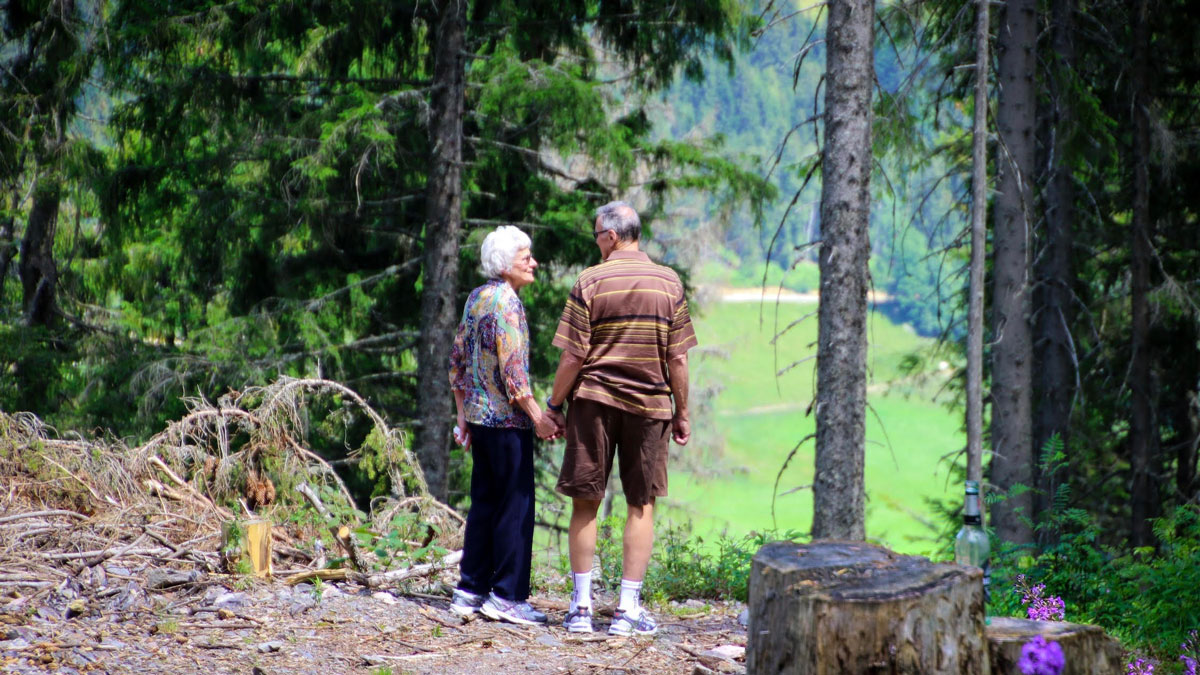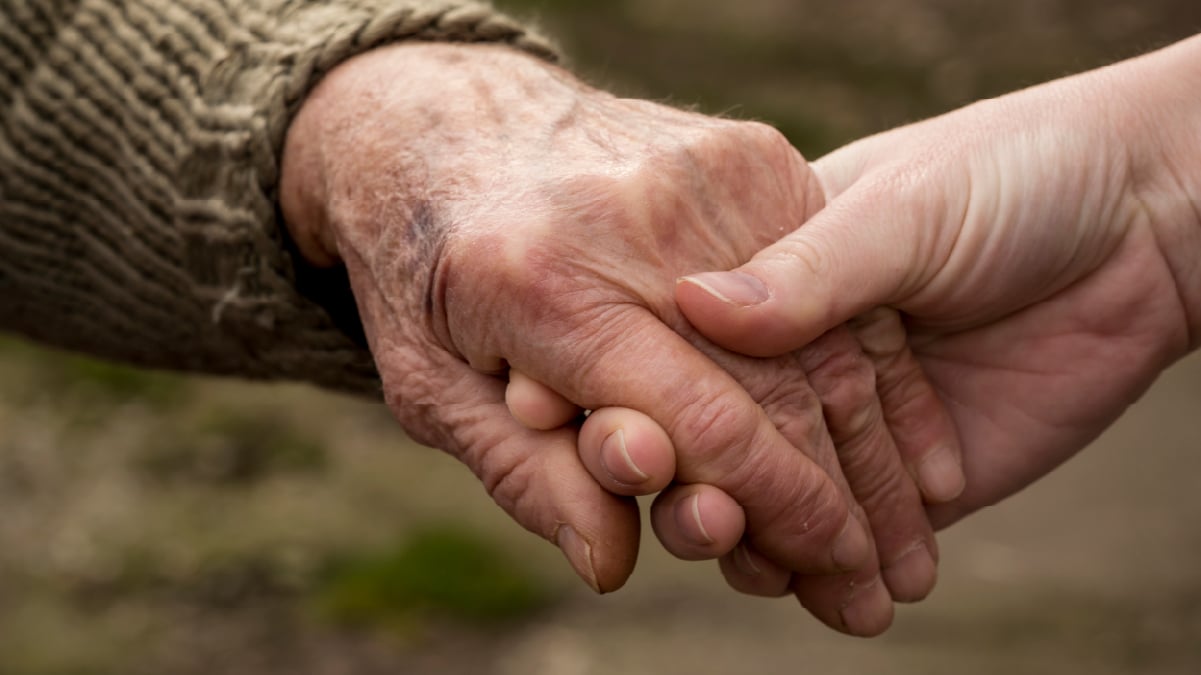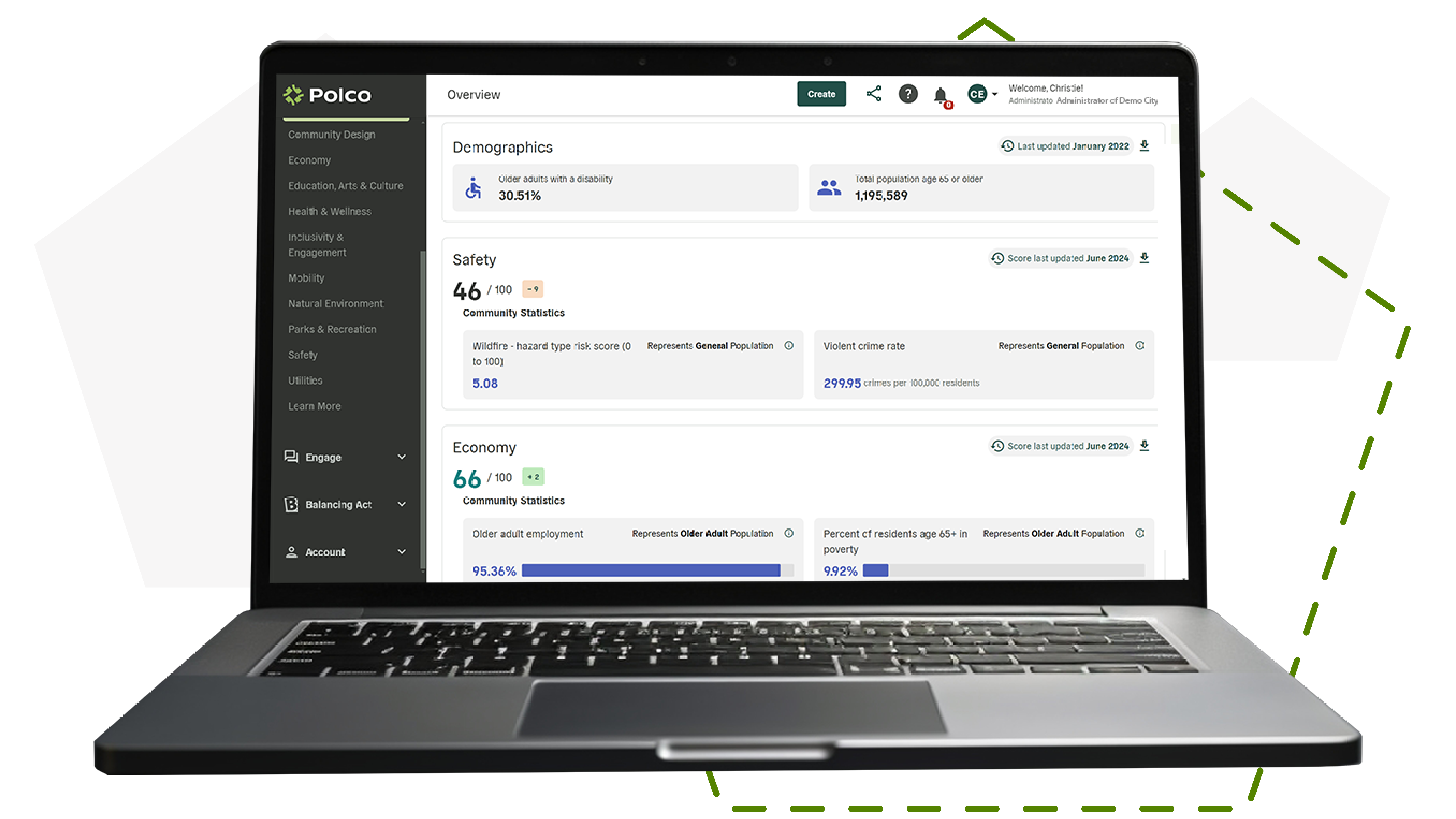How Resident Data Informs Virginia’s State Plan on Aging
By Polco on July 6, 2023

- Virginia’s aging department needed a way to capture resident feedback across the state to inform their State Plan on Aging, but this would require immense time and effort.
- The State used CASOA, a scientific survey of older adults, to collect and analyze the needed feedback all across the region.
- The aging department partnered with organizations throughout the state to share the results, which revealed older adult concerns and priorities that informed the State Plan on Aging.
Virginia Needed Data for the State Plan on Aging
As we age, our needs change significantly. We need better access to health care, home modifications, and mobility, among other concerns. State Units on Aging (SUAs), government departments that assist local area aging organizations, are required to address aging issues and provide services for older adults and their families with State Plans on Aging. These plans are more important than ever as the US population grows increasingly older. But most states lack quality data to inform these vital plans.

Data from CASOA showed that many older adults didn't know where to find information about services available to them
Virginia requires their SUA, the Department for Aging and Rehabilitative Services (DARS), to collect resident feedback via a needs assessment before making the state plan. This helps the state better prepare for what’s ahead.
“Generally, people don't want to think about their own aging,” said Charlotte Arbogast, Senior Policy Analyst at Virginia DARS. “We tend to hear from people when they are in a crisis. And that is not often the best way to process information and make long-term planning decisions."
DARS needed to be more proactive. But traditional in-person listening sessions, older adult advisory councils, and public hearings proved insufficient. These strategies did not provide a truly representative picture of older adults’ needs. DARS would continually hear from the same small group of people already plugged into older adult organizations in the area.
Additionally, the state general assembly specifically wanted to assess home modification priorities and in-home services.
“Home modifications and in-home services can be really crucial services that can keep people in the community,” Arbogast said.
State leaders knew that older adults had unmet needs in this area, but didn’t know what specific modifications were the most essential.
DARS needed a way to reach residents across the state to fulfill the needs assessment requirement and find out answers to these questions. But developing questions and executing a state-wide survey takes immense effort. DARS wanted a tool that could do the heavy lifting and provide accurate and reliable resident data to inform their state plan.
Uncovering the Needs of Older Virginians with CASOA
DARS chose Polco’s Community Assessment Survey for Older Adults (CASOA), a survey that lets leaders hear directly from older adult residents across the state. Created by survey experts and analyzed by data scientists, CASOA is the first and only tool of its kind. It reveals older adults’ most pressing concerns through Polco’s civic engagement and data analytics platform, so states can look at the data and easily identify focus areas across the region. Officials can then align the state plan around what is most important to their residents.
Arbogast and her team worked with the state’s 25 local level aging services organizations, known as Area Agencies on Aging (AAA), local governments, and other groups to get the word out about the survey. DARS prepared each aging organization with talking points in case residents had questions.
“We tried to reach everybody that works with older adults to help us promote the survey and give it credibility,” Arbogast said.
Almost 9,000 older adults in the state participated in the survey. The respondents were a much more diverse sample of older Virginians than the listening sessions of the past.
“What we found to be beneficial was having a way to reach people who are out in the community and aren’t plugged in to our network already, so it was a more representative sample of what the potential needs truly are,” Arbogast said.
Abrogast said she was pleasantly surprised that the results reinforced what is also in the literature– that older adults generally have a very optimistic, positive view of both their lives and their communities.
But the state also uncovered concerns they did not expect.
Turning the Data into a State Plan
CASOA results revealed housing, mental health, and physical health were the biggest concerns for older adults in Virginia. At least 45% of older residents reported these areas as a major or moderate problem.

Data from CASOA reveals some of the top concerns for older adults in Virginia
Interestingly, CASOA data revealed much more of a need for home maintenance services, like snow removal or yard mowing, than personal care. Yet, these services tend to be forgotten when it comes time to fund and resource initiatives.
DARS doesn’t ultimately make the funding decisions at the state agency level, so they are hoping to collaborate with other state agencies and their partners to get the word out.
“What really surprised me was the finding around the need for accessing information about services,” Arbogast said. The survey revealed that many older Virginians do not know about their local AAA or what services are available to them.
Arbogast said the state has made efforts to inform older residents about the services available to them. The No Wrong Door initiative, for example, is a statewide network that connects caregivers to older adults.
“Clearly there’s more opportunity here to make sure that the services and support that are available are actually being conveyed to the public in a meaningful way,” Arbogast said.
As expected, the results also showed a need for better in-home services and modifications. These services are expensive and often underfunded even though the majority of older adults desire to age in place. CASOA results show 73% of older Virginians planned to remain in their community during retirement.

Results from CASOA showed that many older adults in Virginia desire to age in place
Digging Into Results
With the CASOA results in hand, DARS presented the results to each AAA to explore the results together. Everyone learned how to log into Polco and navigate the data themselves. The AAAs were able to ask Polco staff questions about the methodology and reports.
As an added byproduct of the statewide CASOA research, each individual region now had access to the data in their community. Many of Virginia's AAAs are small and rural and would not have the resources to do something like this on their own.
“It’s been really nice to support those smaller AAAs by giving them some local data, and hopefully they’re working with their local governments and communities to provide some education about the needs,” Arbogast said.
The group brainstormed how they could use their local-level results for grant writing, education, social media, and more.
DARS used the CASOA results to guide the State Plan on Aging.
The agency also used the results in partnership with the Virginia Center on Aging at Virginia Commonwealth University for the Annual Update on Aging, as well as the biennial Virginia Governor’s Conference on Aging. DARS posted the results to their website and plans to launch a press release when the state plan is finalized and goes into effect in October.
Together, these organizations continue to advocate for the needs of older Virginians and work together to find solutions. Using data as the foundation for long-range planning, they’re able to make informed decisions that solve for the challenges older adults face throughout the commonwealth. Without including older adults’ voices through CASOA, states are less equipped to create State Plans on Aging that reflect the actual needs of older adults. Resident feedback collected and analyzed through CASOA powered a State Plan that will prepare Virginians for what is ahead as the older adult population continues to grow.
Use CASOA to Inform Your State Plan on Aging
Learn how CASOA can give you data for decision-making and long-range planning directly from your older adult community.
About Charlotte Arbogast
Charlotte currently serves as a senior policy analyst and regulatory coordinator with the Virginia Department for Aging and Rehabilitative Services (DARS). Her in capacity at DARS, she coordinates the agency’s regulations, assists with tracking federal and state legislation and regulations, provides staff support to the Commonwealth Council on Aging, and serves as the lead writer for Virginia’s State Plan for Aging Services and a subject matter expert on aging policy. In starting her career, Charlotte Arbogast graduated from Virginia Commonwealth University in 2012 with a master’s degree in gerontology and a postgraduate certificate in public management. She previously worked as a health policy analyst for the Virginia Department of Health and a long-term care policy analyst for the Virginia Department of Medical Assistance Services. In her time working at DARS, she has also served as the Commonwealth of Virginia’s first dementia services coordinator. In the spring semesters, she also works as an adjunct instructor with the Department of Gerontology at Virginia Commonwealth University.
Related Articles
Popular posts
Sign-up for Updates
You May Also Like
These Related Stories

National Survey Reveals Shocking Gaps in Housing for Older Adults

How Polco’s New Track Feature Puts Older Adults’ Data in Focus


